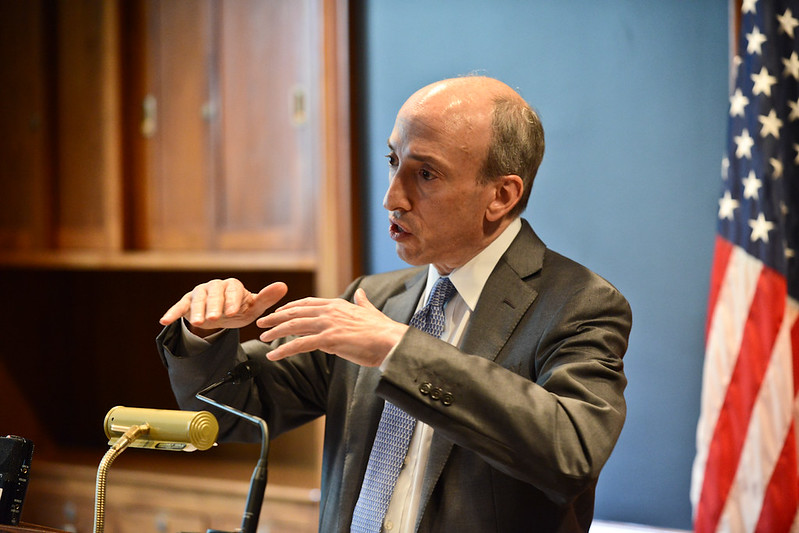 BLOCKCHAIN
BLOCKCHAIN
 BLOCKCHAIN
BLOCKCHAIN
 BLOCKCHAIN
BLOCKCHAIN
U.S. Securities and Exchange Commission Chair Gary Gensler has reiterated today that he continues to believe that cryptocurrencies are securities but said he would support Congress giving oversight for the industry to the Commodity Futures Trading Commission.
The comments by Gensler (pictured) came during a wide-ranging interview with former Secretary of Commerce Penny Pritzker at the NYC Summit, a conference for venture capitalists and tech founders. Gensler’s key argument that cryptocurrencies are securities is that the underlying companies are run by entrepreneurs looking to attract public investors.
Fortune reported that Gensler said crypto intermediaries should be registered with the agency. “I’ve said, ‘Come in, talk to us, help get the intermediaries registered — the crypto exchanges, the crypto lending platforms, the crypto broker dealers, registered,’” he said in the interview.
In a speech delivered at an event organized by the Practicing Law Institute before the interview, Gensler cited President Franklin Delano Roosevelt and the first federal securities laws as why cryptocurrency should be regulated by the SEC.
“The Securities Act of 1933 was about companies raising money from the public,” Gensler explained. “Investors could decide which risks to take; companies that issued securities to the public were required to provide full, fair and truthful disclosures to the public. FDR called this law the ‘Truth in Securities Act.'”
Gensler added that the core principles from the various statutes over the years apply to all corners of the securities market, including securities and intermediaries in the crypto market. “Nothing about the crypto markets is incompatible with the securities laws,” Gensler said. “Investor protection is just as relevant, regardless of underlying technologies.”
There has been an ongoing debate in some circles as to whether the SEC or CTFC should be in charge of regulating crypto. In a proposed law floated in April, the CTFC would have full authority over cryptocurrency, with the CTFC seen by the industry as a more favorable regulator.
While Gensler’s interview and speech gained most of the media attention, the White House also warned that it would restrict or even outright ban cryptocurrencies if they did not reduce greenhouse gas emissions. Cryptocurrency mining is famously energy-hungry, with one previous report suggesting that mining consumes 127 terawatt-hours per year, higher than the entire annual electricity consumption of Norway. By comparison, Google LLC is estimated to use 15.4 terawatt-hours per year as of 2020.
The Climate and Energy Implications of Crypto-Assets in the United States report from the White House Office of Science and Technology Policy encourages lawmakers to consider legal limitations or outright restrictions if other strategies to reduce crypto mining’s environmental impact fail to catch on.
The report suggested that the Environmental Protection Agency should provide technical assistance and work with the crypto-asset industry and others to develop effective environmental performance standards for the responsible design, development and use of environmentally responsible technologies.
“Should these measures prove ineffective at reducing impacts, the Administration should explore executive actions and Congress might consider legislation, to limit or eliminate the use of high energy intensity consensus mechanisms for crypto-asset mining,” the report stated.
Support our mission to keep content open and free by engaging with theCUBE community. Join theCUBE’s Alumni Trust Network, where technology leaders connect, share intelligence and create opportunities.
Founded by tech visionaries John Furrier and Dave Vellante, SiliconANGLE Media has built a dynamic ecosystem of industry-leading digital media brands that reach 15+ million elite tech professionals. Our new proprietary theCUBE AI Video Cloud is breaking ground in audience interaction, leveraging theCUBEai.com neural network to help technology companies make data-driven decisions and stay at the forefront of industry conversations.